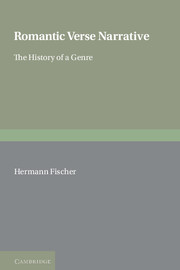Book contents
- Frontmatter
- Contents
- Preface
- List of abbreviations
- Dedication
- Introduction
- Part I The genre and it historical context
- Part II The history of the romantic tale in verse: poets, works, critics and the public
- 3 Early forms
- 4 The establishment of the genre by Sir Walter Scott, its fashionable period, and limitatins by other poets
- 5 ‘The postscript of the Augustans’ and the opposite of the romance
- 6 Ramification and dissolution
- 7 The subsequent fate of the genre
- Conclusion
- Notes
- Bibliography
3 - Early forms
Published online by Cambridge University Press: 27 March 2010
- Frontmatter
- Contents
- Preface
- List of abbreviations
- Dedication
- Introduction
- Part I The genre and it historical context
- Part II The history of the romantic tale in verse: poets, works, critics and the public
- 3 Early forms
- 4 The establishment of the genre by Sir Walter Scott, its fashionable period, and limitatins by other poets
- 5 ‘The postscript of the Augustans’ and the opposite of the romance
- 6 Ramification and dissolution
- 7 The subsequent fate of the genre
- Conclusion
- Notes
- Bibliography
Summary
The previous chapter closed with a summary of the developments which produced the romantic tale in verse. The discovery of the genre was attributed to Scott, but this interpretation must now be slightly amended.
Scott's Lay of the Last Minstrel did not represent something entirely new, it was simply the most exciting and successful product of a tendency that had been developing for a long time. Even before Scott a few poets had attempted a similar mixture of the elements in question, and, although they approached the task from different angles, they achieved similar results. In fact, in the Introduction to the Lay in the complete edition of his poetic works published in 1830, Scott refers to some of these early forms and admits the influence they had on him.
The work with which we will begin nevertheless had at the most an indirect influence on Scott. It is W. S. Landor's Gebir, a poem that appeared in 1798, in the year of the Lyrical Ballads, the year English romanticism was born. It was to have an important influence on Southey and Shelley1 and occupies a middle position between the epic poem in the classical style and the romantic tale in verse, at the turning point between the tastes of the eighteenth century and those of the nineteenth.
- Type
- Chapter
- Information
- Romantic Verse NarrativeThe History of a Genre, pp. 57 - 85Publisher: Cambridge University PressPrint publication year: 1991



